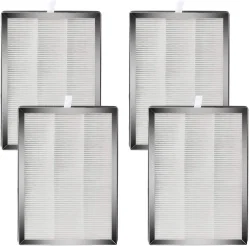Features and considerations related to HEPA filters
2023-11-27
HEPA (High-Efficiency Particulate Air) filters are a type of mechanical air filter commonly used in air purifiers and vacuum cleaners. These filters are designed to capture and trap airborne particles, providing efficient removal of allergens and other contaminants from the air. Here are key features and considerations related to HEPA filters:
Characteristics of HEPA Filters:
1. Particle Removal Efficiency:
- HEPA filters are highly efficient at capturing particles, including dust, pollen, pet dander, mold spores, and even some bacteria.
2. Standardization:
- True HEPA filters meet specific standards set by regulatory organizations. In the United States, for a filter to be considered a True HEPA filter, it must remove at least 99.97% of particles that are 0.3 micrometers in diameter.
3. Filter Construction:
- HEPA filters are made of a dense mat of randomly arranged fibers, usually composed of fiberglass. The fibers create a maze-like structure that effectively traps particles.
4. Usage in Air Purifiers:
- HEPA filters are commonly used as the primary filtration system in air purifiers. They are often combined with pre-filters, activated carbon filters, or other technologies for comprehensive air purification.
5. Applications:
- HEPA filters are used not only in air purifiers but also in various settings where clean air is crucial, including cleanrooms, hospitals, and certain industrial environments.
6. Particle Size Filtration:
- While HEPA filters are most efficient at capturing particles around 0.3 micrometers, they are effective at trapping both smaller and larger particles due to the filter's design.
Considerations:
1. Replacement Frequency:
- HEPA filters require regular replacement to maintain their effectiveness. The frequency depends on factors like the level of airborne contaminants and the manufacturer's recommendations.
2. Maintenance:
- Some HEPA filters are washable and reusable, while others are disposable. Check the manufacturer's instructions for proper maintenance.
3. Sealing and Bypass:
- Proper sealing of the filter within the air purifier is crucial to prevent air from bypassing the filter. A well-sealed system ensures that all air passes through the filter.
4. Filter Ratings:
- Look for air purifiers that specify the use of True HEPA filters, as these meet the highest standards for particle removal efficiency.
5. Combination Filters:
- HEPA filters are often used in combination with other filter types, such as pre-filters for capturing larger particles or activated carbon filters for adsorbing odors and gases.
6. HEPA-Type Filters:
- Some filters labeled as "HEPA-type" or "HEPA-like" may not meet the strict standards of True HEPA filters. It's essential to check product specifications for particle removal efficiency.
HEPA filters play a crucial role in improving indoor air quality by reducing the concentration of airborne particles. When considering an air purifier, understanding the characteristics and specifications of the HEPA filter used is key to selecting an effective filtration system.



